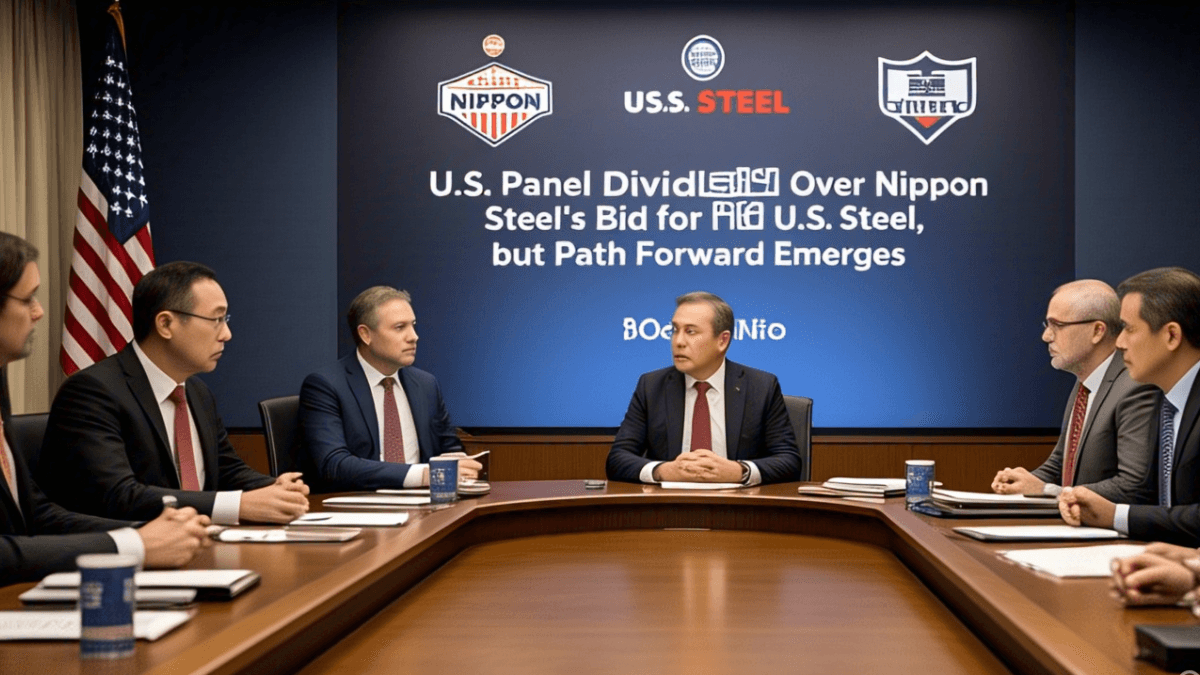The U.S. national security panel remains split on Nippon Steel’s $14.9B bid for U.S. Steel. Despite divisions, a potential path forward is emerging as President Trump considers the deal.(Reuters)
Table of Contents
- Introduction
- Background of the Nippon Steel-U.S. Steel Deal
- CFIUS Review and National Security Concerns
- Union Opposition and Political Implications
- Nippon Steel’s Commitment and Investment Plans
- Potential Outcomes and Next Steps
- Conclusion
- FAQs
Introduction
The proposed acquisition of U.S. Steel by Japan’s Nippon Steel has become a focal point of debate in the United States, intertwining issues of national security, economic strategy, and political influence. As the Committee on Foreign Investment in the United States (CFIUS) submits its divided recommendation to President Donald Trump, the future of this $14.9 billion deal hangs in the balance.(Reuters)
Background of the Nippon Steel-U.S. Steel Deal
In December 2023, Nippon Steel announced its intention to acquire U.S. Steel for approximately $14.9 billion. The deal aimed to combine Nippon’s advanced steelmaking technologies with U.S. Steel’s established presence in the American market. However, the proposal quickly attracted scrutiny from various stakeholders concerned about the implications of foreign ownership of a key American industry.(Reuters)
CFIUS Review and National Security Concerns
The CFIUS, responsible for evaluating foreign investments for potential national security risks, conducted a thorough review of the proposed acquisition. While some agencies within the committee believed that mitigation measures could address security concerns, others remained unconvinced. This division led to a split recommendation being submitted to President Trump, who now has 15 days to make a final decision on the matter. (Reuters)
Union Opposition and Political Implications
The United Steelworkers union has been a vocal opponent of the deal, urging President Trump to block the acquisition. The union argues that Nippon Steel’s history of allegedly dumping steel in U.S. markets poses a national security threat and could undermine the domestic steel industry. This opposition has significant political ramifications, especially in swing states like Pennsylvania, where steel production is a major economic driver. (Reuters)
Nippon Steel’s Commitment and Investment Plans
In an effort to alleviate concerns and gain approval, Nippon Steel has pledged a substantial investment in U.S. operations. The company plans to invest $14 billion, including $4 billion for a new steel mill and $11 billion for infrastructure upgrades through 2028. Nippon Steel has also committed to maintaining U.S. Steel’s headquarters in Pennsylvania and appointing American citizens to top management positions, aiming to align with U.S. national interests. (Reuters, Reuters, Reuters)
Potential Outcomes and Next Steps
With the CFIUS unable to reach a consensus, the decision now rests with President Trump. He must weigh the economic benefits of foreign investment against potential national security risks. If the deal is approved, it could lead to significant modernization of U.S. Steel’s operations. Conversely, rejection could strain U.S.-Japan relations and impact future foreign investments in the U.S.(Voice of America)
Conclusion
The proposed acquisition of U.S. Steel by Nippon Steel presents a complex interplay of economic opportunity and national security concerns. As President Trump deliberates on the CFIUS’s divided recommendation, the outcome will have lasting implications for the U.S. steel industry, foreign investment policies, and international relations.
FAQs
Q1: What is the main concern regarding Nippon Steel’s acquisition of U.S. Steel?
The primary concern revolves around national security, with critics fearing that foreign ownership could compromise the U.S. steel industry’s integrity and competitiveness.(Reuters)
Q2: How has Nippon Steel addressed these concerns?
Nippon Steel has proposed significant investments in U.S. operations, including building a new steel mill and upgrading infrastructure. They have also committed to keeping U.S. Steel’s headquarters in Pennsylvania and appointing American citizens to key management positions.
Q3: What role does the United Steelworkers union play in this situation?
The United Steelworkers union opposes the deal, citing national security risks and potential negative impacts on American jobs and the domestic steel industry.
Q4: What happens next in the approval process?
President Trump has 15 days to make a final decision based on the CFIUS’s divided recommendation. His decision will determine whether the acquisition proceeds or is blocked.
